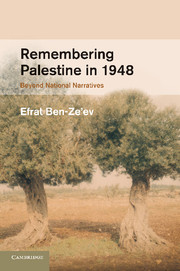Book contents
- Frontmatter
- Contents
- List of illustrations
- Maps
- Preface
- Map of Palestine prior to 1948
- Introduction
- Part I Constructing Palestine: National Projects
- Part II Palestinian-Arab Memories in the Making
- 4 1948 from a Local Point of View
- 5 Rural Palestinian Women
- 6 Underground Memories
- Part III Jewish-Israeli Memories in the Making
- Part IV British Mandatory Memories in the Making
- Conclusions and Implications
- Bibliography
- Notes
- Index
- Studies in the Social and Cultural History of Modern Warfare
4 - 1948 from a Local Point of View
The Palestinian Village of Ijzim
Published online by Cambridge University Press: 07 October 2011
- Frontmatter
- Contents
- List of illustrations
- Maps
- Preface
- Map of Palestine prior to 1948
- Introduction
- Part I Constructing Palestine: National Projects
- Part II Palestinian-Arab Memories in the Making
- 4 1948 from a Local Point of View
- 5 Rural Palestinian Women
- 6 Underground Memories
- Part III Jewish-Israeli Memories in the Making
- Part IV British Mandatory Memories in the Making
- Conclusions and Implications
- Bibliography
- Notes
- Index
- Studies in the Social and Cultural History of Modern Warfare
Summary
This chapter dwells on the memories of Arab-Palestinian villagers who were uprooted in 1948, juxtaposing them with Israeli army documents written at the time. The oral accounts of the Palestinian refugees describe 1948 as a set of events whose ultimate catastrophic outcome was realized only years later. The series of events that would later be called al-Nakba was at first perceived as a set of local incidents. In the case of the village of Ijzim, on which I focus here, they included occasional clashes on the Haifa–Tel Aviv road, reciprocal kidnapping (Jews by Arabs and Arabs by Jews), and short encounters with soldiers defined as “foreign” – Palestinians from other regions or Iraqis who joined the fighting in May 1948. In these oral testimonies, each event comes across as relatively isolated, hardly ever referred to as being part of “the war.” When the villagers describe how in July 1948 they were forced to flee due to heavy Israeli attacks, they note that at the time their escape was understood as a temporary evacuation until the storm would subside.
The dominant Jewish-Israeli version differs considerably: 1948 is perceived as a civil conflict followed by a full-fledged war culminating in an Israeli victory. However, when one analyzes the documents that were produced by the Jewish fighting forces during the events, one discovers that they often support and complement the Palestinian villagers' narratives. Compiled together, these army documents form a set of diverse accounts.
- Type
- Chapter
- Information
- Remembering Palestine in 1948Beyond National Narratives, pp. 63 - 84Publisher: Cambridge University PressPrint publication year: 2011

